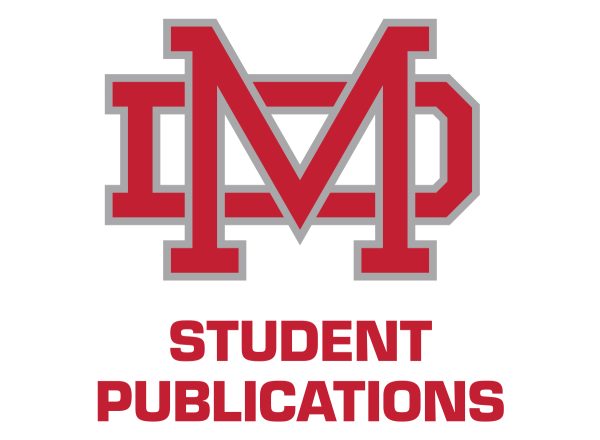Interacting with law enforcement in 2021
After the events of the past year and a half, including the opposing Black Lives Matter and Blue Lives Matter movements, the stigma surrounding interactions with law enforcement has only grown.
Everyone has their own thoughts on the issues, but ultimately, you may find yourself having an interaction with law enforcement for one reason or another during your lifetime and it is important to understand your rights and the proper procedure for interacting with the police.
Community experiences and opinion
On average, 1 in 5 students at the school who have been driving for 6 months or longer have been pulled over.
One such student, junior Jared McDuffie, was pulled over after checking his phone while driving.
McDuffie stated that although he was unaware of the procedure, he was not nervous about interaction, instead, he felt regretful that he was pulled over. After the experience, he would only advise following the law so as to avoid being ticketed.
Unlike Jared, for most young drivers the thought of getting pulled over is daunting. Not only due to possibly receiving a ticket, but because of the inevitable interaction with police.
According to The Stanford Policing Project, more than 50,000 people are pulled over while driving each day and more than 20 million drivers are pulled over every year.
The chance of getting pulled over while driving is high, but drivers who know how to properly conduct themselves and know their rights when interacting with police are not as common.
When religion teacher Alec Sixta was pulled over for not having license plates on his new vehicle a few years ago, his interaction with police only heightened his nerves.
Fear is a typical response to the realization that one is about to be pulled over. Perhaps it is because of fear of punishment, or because of predisposed notions of police officers created by the media and the entertainment industry.
“There’s this innate bias that has been created by society,” Sixta said. “And when that situation presents itself, I react the way society has told me to do, which is in this case [is being] nervous.”
In the past year, the media has highlighted stories of people of color in America being discriminated against and even losing their lives due to interactions with police. In 2020, the names George Floyd, Breonna Taylor, Elijah McClain, and a plethora of other people of color who were killed in relation to interactions with police officers became synonymous with the #SayTheirNames and Black Lives Matter movements.
These nationally publicized events have caused a number of people in the United States to distrust and dislike police officers.
“We need more understanding of both sides,” Sixta said. “We need to understand the bias from [one] side and the bias from [the other] so that we can begin true dialogue instead of saying this is how it is and it’s always going to be like this. The only way you can create change is if there is a dialogue. Not in debate, but in wanting to create change or resolution.”
Proper procedure for interacting with law enforcement
In order to create a safe environment to foster change in the interactions between civilians and law enforcement, it is essential to know one’s rights and what one should and should not say when interacting with police.
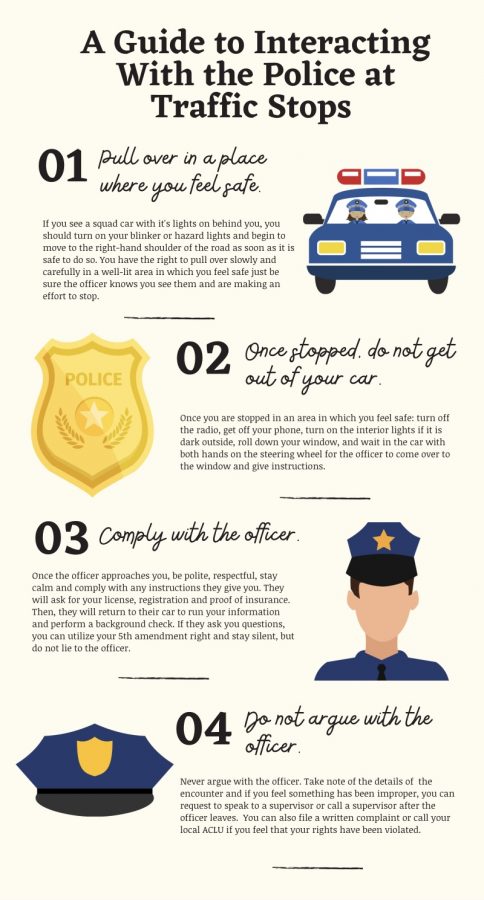
Peter A. Zarcone, a recently retired LAPD Commanding Officer and father to a 2020 graduate of MD, has been on the force for over 30 years and experienced traffic stops from the perspective of both the civilian being pulled over and the officer pulling someone over.
“When I was working patrol, I would typically make between 5 and 10 stops per shift,” Zarcone said. “Most officers working patrol will be close to that range. There is always a reason [as to why officers pull drivers over] — an observed traffic or equipment violation, reasonable suspicion of a crime, or probable cause for arrest.”
If you see the flashing lights of a squad car behind you, you should turn on your right blinker and slowly and carefully pull over to the right-hand shoulder of the road as soon as you feel safe to do so. You have the right to wait to pull over until you can stop in a well-lit area where you feel safe. Just be sure that the officer pulling you over is aware that you see them and are preparing to pull over so they do not think you are attempting to flee.
When you are pulled over, it is important for you to understand the proper procedure and the best way to avoid any negative escalation of the situation.
“People should know that the best way to stay safe is to comply with the officer’s instructions,” Zarcone said. “It is a very bad idea to get confrontational. Turn off the stereo, get off the phone, roll down your window, and stay seated with both hands on the steering wheel unless the officer instructs you to exit. The officer has a job to do. It might be simply to issue a ticket or a warning, but he might have a reason to believe you have been involved in a crime and need to detain you. Never argue, just do what he or she says.”
To reiterate what Zarcone said: when you pull over you should turn off the radio, get off the phone, turn on the interior lights if it is dark outside, roll down your window, and stay seated with both hands on the steering wheel until the officer instructs you to do otherwise.
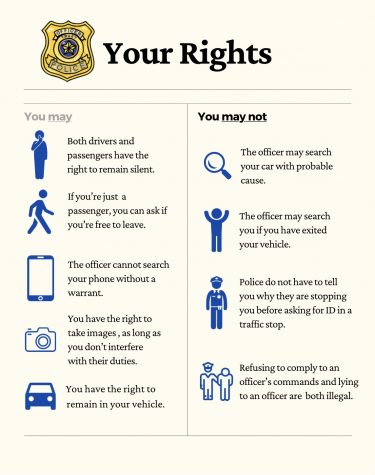
Once you are approached by police, be polite and respectful and comply with any instructions they give you. You will be asked for your license, registration and proof of insurance. Then they will return to their car to run your information through their computer and perform a background check.
Be cooperative and give basic information when requested, but do not give the police any unnecessary information. You have the right to remain silent.
You also have the right to not allow the officer to search your car or cellphone without your consent or a warrant. But if the officer believes they have probable cause or you are arrested during the traffic stop, they can search your car.
“I can’t overstate the importance of compliance,” Zarcone said. “Once everything is over, if your belief is that something was improper, you can request to speak to a supervisor, or call one later after the officer leaves.”
For more information about traffic stops in California and your rights visit:
Your donation will support the Student Publications Department at Mater Dei High School. Your contribution will allow us to keep our equipment up to date and cover our annual website hosting costs.




![WORK TO SUCCEED By working these tips into their study schedule, students can reap the benefits of AP courses. With just a few easy lifestyle changes, and new methods before the test, students can see an increase in scores that other successful students have witnessed. “It‘s really about making sure that throughout the year you know what you're doing,” senior Angela Karanja said. “[Also] being calm the day of, so that you can remember everything that you learned [is helpful].” Infographic by Ava Gomez.](https://thescarletscroll.com/wp-content/uploads/2025/03/IMG_5210-600x338.jpeg)
![A YEAR IN REVIEW
Between Nov. and Dec. 2024, 57 respondents voted for their favorite songs, artists, and albums. Every category had multiple options, and each one faced tight competition as the artists Sabrina Carpenter, Kendrick Lamar, and Billie Eilish battled for the top spots. Students like senior Payton Bauer encourages others to check out other popular singers, if they haven’t already. “I would say [listen to Carpenter] if you're [wanting to] feel good about yourself,” Bauer said. “Or maybe you just want something to work out or dance to. [Her music is] really fun.”](https://thescarletscroll.com/wp-content/uploads/2025/02/Orange-Black-Why-Vinyl-Records-Rock-Music-Infographic-e1738774839991.png)
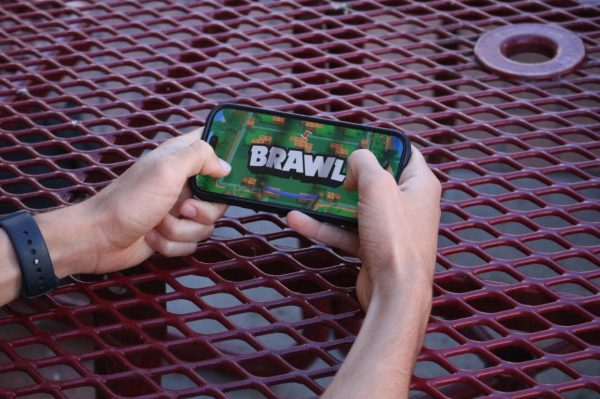
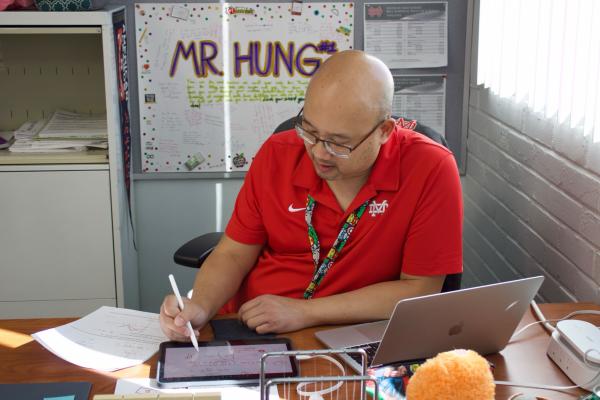

![DUNK THE TRASHKETBALL Honors Biology Teacher Kelly Petro clarifies the rules of his interactive science activity. Trashketball, Petro’s newly created game, reinstates crucial science concepts and terminology while allowing students to study recently learned material. Whether in the classroom or on the lacrosse field, Petro ensures that his student-athletes absorb the information using unique study methods. “For school, I try [to have] a general sense of what works for everyone in the classroom [studying wise]. I want everyone to know the [importance of what we are doing in biology],” Petro said.](https://thescarletscroll.com/wp-content/uploads/2025/06/HEIF-Image-600x400.jpeg)
